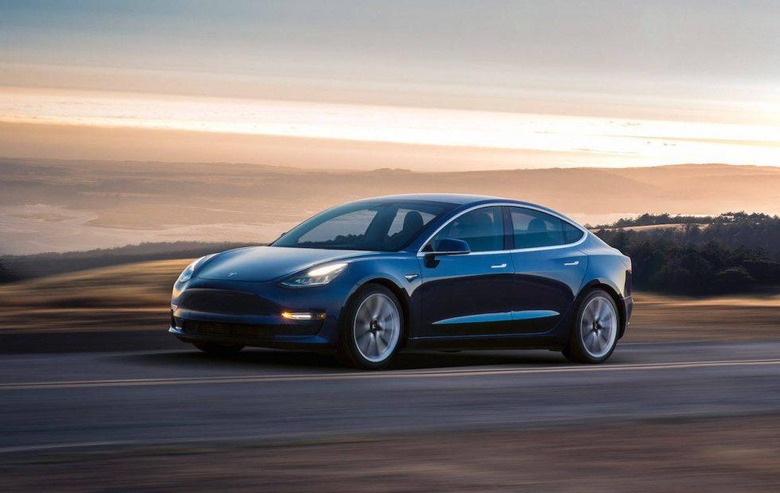Tesla Q1 2018: Model 3 Helps Drive $3.41bn Revenue
Tesla coaxed Model 3 production to 2,270 cars per week in April, the electric automaker confirmed today, after CEO Elon Musk took drastic steps to boost manufacturing. The company announced a Q1 2018 update today, addressing widespread concerns about just how many of the more affordable electric sedans it could ramp up to producing.
Tesla's initial goal had been to have its factory pumping out 5,000 Model 3 cars per week at this stage. That was scaled back dramatically, however, as the challenge facing the company became more clear. Last month, Musk returned to sleeping at the factory in order to take direct control over the manufacturing facility.
It seems that focus has paid off. Tesla produced more than 2,000 Model 3 per week, for three straight weeks, the company said. In the last of those weeks, it made 2,270 of the cars. Indeed, it's feeling confident enough to make some new predictions.
"We continue to target Model 3 production of approximately 5,000 per week in about two months," the California automaker said today. The bottleneck so far has been the battery module line, Tesla pointed out, though the addition of semi-automated lines and improvements to the existing production flow have apparently addressed that. Tesla now believes it can hit 5,000 car sets of battery modules per week.
That 5,000 figure is an important one, as beyond it lies the promise of a lot more flexibility for Model 3 customers. "After achieving a production rate of 5,000 per week," Tesla points out, "we will begin offering new options such as all-wheel-drive and the base model with a standard-sized battery pack." The process will be punctuated with some planned downtime, which will be used to address "known constraints" that arise during the scale-up.

"Once we hit the 5,000 per week milestone," the automaker concludes, "we intend to incorporate our learnings to continue to increase output on our existing manufacturing lines beyond 5,000 units per week, and then in a capital efficient manner to add incremental capacity to ultimately get to a 10,000 unit weekly rate."
Perhaps stung by ongoing criticism of both its production quality and its safety record, Tesla addresses both in its Q1 2018 report. On the former, it claims that "based on every measurable metric" the Model 3 is the highest quality vehicle the company has produced. Automation, meanwhile, has helped improve on safety in the factory, though Tesla concedes it has "temporarily dialed back" automated processes in favor of semi-automated or even manual versions in a handful of steps.
At the same time, Tesla says it produced 24,728 Model S and X cars, and insists that demand "remains very strong." 21,815 of those cars were delivered in Q1. In the same period, 9,766 Model 3 were produced, and 8,182 delivered. Model 3 net reservations "continued to exceed 450,000" at the end of the quarter.
As for the infrastructure side, 77 new Supercharger locations opened in the three month period, with a total of 1,205 stations and in excess of 9,300 stalls worldwide. The majority of the growth has been in North America.
In solar, Q1 energy storage deployments were up 161-percent, Tesla says, and it deployed "a record number" of its Powerwall residential systems. Solar Roof production, meanwhile, which has proved tricky so far, is expected to "accelerate significantly" in the second half of 2018.
Automotive revenue for the quarter was up to $2.74bn, a 19-percent rise year on year. Overall revenues beat analyst expectations, at $3.41bn. That, Tesla says, is mainly down to Model 3 deliveries but also a new accounting standard. Model 3 gross margin is still negative, mind, something Tesla blames on underutilization of manufacturing capabilities.
